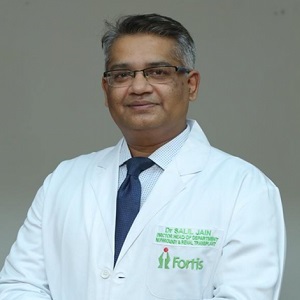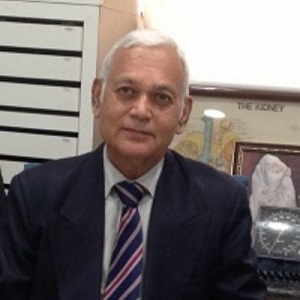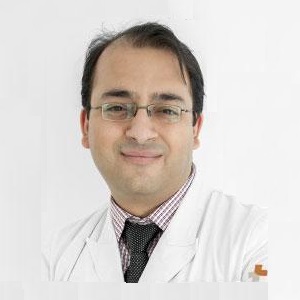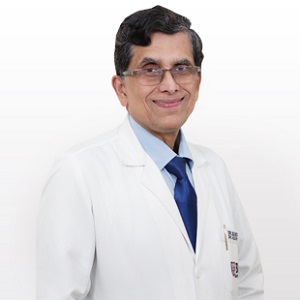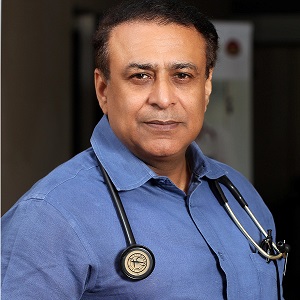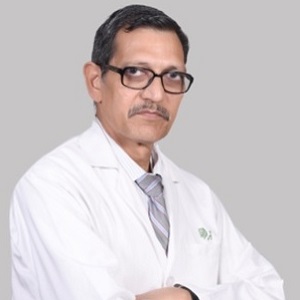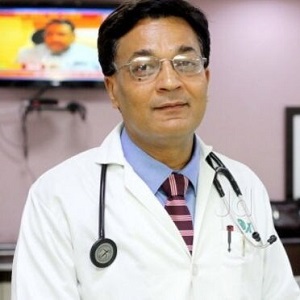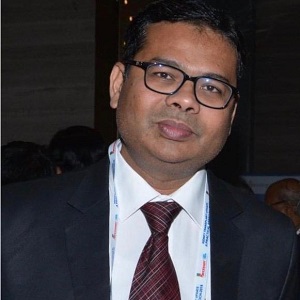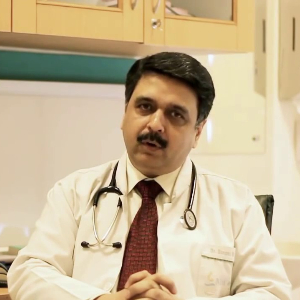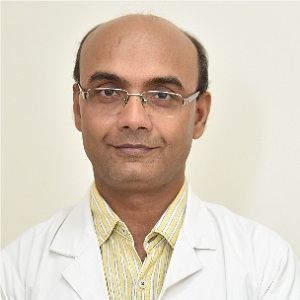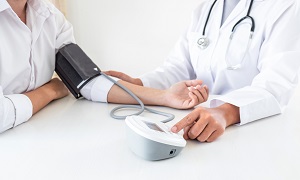Best Doctors in India for Hemodialysis
- Nephrologist, Gurugram, India
- Over 21 years’ experience
Profile Highlights:
- Dr. Salil Jain is considered one of the best nephrologists in Gurugram and the Delhi region.
- He is the director of the Department of Nephrology at Fortis Memorial Research Institute, Gurugram, and has more than 21 years of experience.
- Dr. Salil Jain is an exceptional clinician having several national and international publications to his credit.
- Nephrologist, New Delhi, India
- Over 35 years’ experience
Profile Highlights:
- Dr. Colonel Akhil Mishra is currently working as Sr. Consultant, Nephrology at Indraprastha Apollo Hospital, New Delhi. He is known for establishing the Department of Nephrology and Transplant at Apollo Hospital in 1995. He has more than 35 years of experience in this field.
- Prior to this he was working in the Army Medical Corps for 28 years (1965-1993), where he held the position of Senior Advisor in Medicine and Nephrology.
- Dr. Akhil Mishra is also known for conducting the First Kidney Transplant of the Indian Armed Forces at Army Hospital, Delhi in 1991.
- Dr. Mishra took pre mature retirement at the rank of Colonel in the year 1993. Subsequently, he established the Department of Nephrology in Escorts Research & Referral Hospital.
- He had been awarded the Vishisht Seva Medal by the President of India in 1980. He started the first kidney transplant in Army and Apollo Hospital, Delhi.
- Throughout his career, Dr. Akhil Mishra has been awarded Star Performer Consultant three times, at Indraprastha Apollo Hospital, Jan 2013, Sept 2014 & Jan 2015.
- Dr. Mishra has also been honored in 2013, by His Holiness the Dalai Lama for his dedicated work in the field of Kidney transplantation.
- He was also felicitated by the Indian Society of Nephrology (North Zone) with the Life Time achievement Award in Nephrology on 23rd Jan.2015 for his huge contribution to the growth of Nephrology.
- Nephrologist, Gurugram, India
- Over 18 years’ experience
Profile Highlights:
- Dr. Sidharth Kumar Sethi is one of the well-known nephrologists in the NCR region and has been actively involved in the care of children with all kinds of complex renal disorders, including nephrotic syndrome, tubular disorders, urinary tract infections, hypertension, chronic kidney disease, and renal transplantation.
- Dr. Sidharth Kumar Sethi has been a part of an 8-member writing committee for the guidelines of Steroid Sensitive Nephrotic Syndrome and an Expert committee involved in the formulation of guidelines for Pediatric Renal Disorders including Steroid Resistant Nephrotic Syndrome and urinary tract infections.
- Nephrologist, New Delhi, India
- Over 30 years’ experience
Profile Highlights:
- Dr. Sunil Prakash is one of the best nephrologists in Delhi. Services offered by him are the diagnosis and treatment of urinary infections, nephritis, kidney stones, chronic kidney disease, and cystic kidney diseases stand out.
- He also guides, indicate,s and monitors the treatment of hemodialysis, peritoneal dialysis, and kidney transplantation.
- The key specialties of Dr. Sunil Prakash are Dialysis and Renal Failure. Today, he is considered one of the top nephrologists in Delhi for kidney transplants.
- Nephrologist, New Delhi, India
- Over 22 years’ experience
Profile Highlights:
- Dr. Sanjiv Jasuja is a Nephrologist & Transplant Physician at the Indraprastha Apollo Hospitals, Sarita Vihar, and at Apollo Hospitals, Noida. Along with an MBBS, his educational qualifications include an MD in Medicine, a DNB in Nephrology, and an MNAMS in Nephrology.
- His 22 years of medical practice are highlighted by his memberships in various prestigious national and international medical societies including the Indian Society of Nephrology, Indian Society of Organ Transplant, Indian Society of Critical Care, Indian Society of Clinical Research, International Society of Nephrology, and European Dialysis & Transplant Society.
- Dr. Sanjiv Jasuja maintains a dedicated medical practice which is evident by his busy schedule in switching between the two branches of Apollo Hospitals, which he manages efficiently. Due to his firm hand and calm demeanor during operations, he has earned a respect among his patients which is evident by his high patient satisfaction rate.
- Nephrologist, New Delhi, India
- Over 20 years’ experience
Profile Highlights:
- Dr. D K Agarwal is a well-known nephrologist, who is currently associated with Indraprastha Apollo Hospitals, as a Senior Consultant in Nephrology. For over 20 years, he has been involved in nephrology, with indoor as well as outdoor patients.
- He specializes in Renal Transplant, hemodialysis, CAPD, and all kidney problems and diseases along with critical kidney patients with emergency management.
- Dr. Agarwal also specializes in handling kidney patients due to Diabetes and Hypertension. He has also published 59 papers national and international.
- Dr. Agarwal is also a life member of several renowned societies such as the Association of Physicians of India; Indian Society of Electrocardiology; Indian Society of Nephrology; Indian Society of Organ Transplantation, Hyderabad Transplant forum, and Indian Association of Clinical Medicine 1994.
- Nephrologist, New Delhi, India
- Over 20 years’ experience
Profile Highlights:
- Dr. Kailash Nath Singh is one of the best Nephrologists working in New Delhi.
- Dr. K.N. Singh is currently working as a leading Senior Consultant in Nephrology & Multi-Organ Transplant unit at Indraprastha Apollo Hospital, New Delhi, India.
- He has also been felicitated recently by his Holiness “DALAI LAMA” for his excellent work in Kidney Transplants.
- Nephrologist, Gurugram, India
- Over 20 years’ experience
Profile Highlights:
- Dr. Shyam B Bansal is Associate Director in Medanta’s Institute of Nephrology and Kidney Transplant.
- He is also known for establishing the department of Nephrology at Medical College Gwalior in 2006.
- Apart from that, Dr. Bansal has published extensively in the field of kidney transplantation and also has the honor of publishing the first case report of kidney transplantation in an HIV-positive patient in India.
- Nephrologist, New Delhi, India
- Over 25 years’ experience
Profile Highlights:
- Dr. Dinesh Khullar with an experience of over 25 years as a renal transplant physician, has been associated with over 5000 successful kidney transplants in his career. Out of these, more than 1200 were performed at Max Hospital, Saket. This includes among the most challenging transplants, such as ABO-incompatible, transplantations in highly sensitized recipients, and high-risk transplants associated with significant comorbidities.
- In addition to this, Dr. Dinesh Khullar is credited for setting up an online hemodiafiltration unit for the first time in North India for advanced and state-of-the-art dialysis.
- Nephrologist, Gurugram, India
- Over 20 years’ experience
Profile Highlights:
- Dr. Shashidhar Shree Niwas is a well-known nephrologist in Delhi/ NCR with expertise in nephrology, dialysis, kidney disease, and transplantation.
- He has many National as well as International publications to his credit. Some of his national publications include ‘Acute Kidney Injury in HIV positive Patients’, ‘Coronary Artery Disease in Diabetes Mellitus’ etc. His paper on ‘Acute Kidney Injury in Developing Countries’ was published in a very prominent international journal.
Best Hospitals in India for Hemodialysis
Indraprastha Apollo Hospital, New Delhi
- City: New Delhi, India
Hospital Highlights:
- Indraprastha Apollo Hospital is a 700-bedded multispecialty hospital in the heart of the capital of India. It is a part of Apollo Hospital group, one of India’s most reputed healthcare chains. Indraprastha Apollo Hospital has been accredited by Joint Commission International, making it the first internationally accredited hospital in the country in 2005.
- There are 52 specialties in the hospital with one of the best cardiology centers in the country. The hospital is also equipped with State of the art infrastructure facilities with the largest Sleep Lab in Asia and the largest number of ICU bed facilities in India.
- The hospital also has one of the largest dialysis units in India along with a dedicated Bone Marrow Transplant unit.
- The latest and highly advanced technologies that are installed in the hospital include Da Vinci Robotic Surgery System, PET-MR, PET-CT, Cobalt-based HDR Brachytherapy, Brain Lab Navigation System, Tilting MRI, Portable CT scanner, 3 Tesla MRI, 128 Slice CT scanner, DSA Lab, Endosonography, Hyperbaric Chamber and Fibro scan.
Fortis Memorial Research Institute, Gurugram
- City: Gurugram, India
Hospital Highlights:
- Fortis Memorial Research Institute is a multi-super-specialty, quaternary care hospital with 1000 beds. The hospital comprises reputed clinicians, and international faculty and is also equipped with cutting-edge technology. The hospital is a part of Fortis Healthcare Limited, a reputed chain of private hospitals in India.
- It is a NABH-accredited hospital that is spread across 11 acres of land and has a capacity of 1000 beds. The hospital has 55 specialties and is one of the premier health care centers in the Asia Pacific region popularly known as “the Mecca of Healthcare”.
- The hospital has 260 diagnostic centers and is also equipped with the latest and advanced techniques that include 3 Telsa which is the world’s first Digital MRI technology. The hospital also has world-class Radiation Therapy techniques which have been developed by leading technology experts from Elekta and Brain Lab.
Apollo Hospital, Chennai
- City: Chennai, India
Hospital Highlights:
- Apollo Hospitals, Chennai, is one of the best hospitals for heart care in India. Over the years, Apollo has expanded all over India, as a healthcare chain.
- India’s first ‘Only Pancreas’ transplant was performed in Apollo Hospital. The hospital is known for successfully performing Asia’s first en-bloc combined heart and liver transplant, and over the years, it has attained a remarkable achievement in the global healthcare space. Around 3-4 organ transplants are performed in the hospital per day.
- Equipped with over 500 beds, this hospital in Chennai was established in 1983 and since then has been among the most preferred hospital for patients from all over the world.
- The hospital holds accreditation of the NABH and JCI and is the first hospital in India to be ISO 9001 and ISO 14001 certified. It is also the first South Indian Hospital to receive subsequent reaccreditation from the JCI USA 4 times.
Medanta-The Medicity, Gurgaon
- City: Gurugram, India
Hospital Highlights:
- One of India’s best and largest multi-specialty hospitals, Medanta was built with the aim to bring India to the highest standards of medical care. The hospital has been providing the best medical services to its patients, since its inception, with care, commitment, and compassion.
- Equipped with 1250 beds, the hospital was founded by Dr. Naresh Trehan in the year 2009 with an aim to provide the best medical care at affordable costs. The hospital is spread across 43 acres and includes 45 operation theatres and 350 beds dedicated solely to ICU. The hospital includes over 800 doctors, and more than 22 specialty departments and has a dedicated floor for individual specialty in order to offer the best services under one roof.
- The hospital is considered one of the premier institutes in India for Cardiac Care and includes staffs and members of high caliber. The hospital has 6 distinct centers of excellence.
Max Super Specialty Hospital, New Delhi
- City: New Delhi, India
Hospital Highlights:
- One of the well-regarded providers in India committed to the highest standards of clinical excellence and patient care, Max Super Specialty Hospital is a part of Max Healthcare, which is the second-largest healthcare chain in India. Regarded as one of the most well-regarded healthcare providers in the country, Max Super Specialty Hospital is committed to the highest standards of clinical excellence as well as patient care. The hospital is also equipped with the latest technology as well as cutting-edge research. The hospital is known to deliver and ensure the highest level of patient care.
- The hospital has more than 500 beds and offers treatment for over 35 specialties. The hospital also holds the credit of having installed the first Brain Suite in Asia. This is a highly advanced Neurosurgical machine that allows MRI to be taken while surgery is ongoing.
- Other advanced and latest technologies are also installed in the hospital such as the 1.5 Tesla MRI machine, 64 Slice CT Angiography, 4D ECHO, LINAC, and 3.5T MRI machine.
Artemis Hospital, Gurugram
- City: Gurugram, India
Hospital Highlights:
- One of the most well-known hospitals in the Delhi NCR, Artemis Hospital is the first hospital in Gurugram to get accredited by the Joint Commission International.
- With more than 40 specialties, the hospital has been designed to be one of the most technically advanced hospitals in the country, with the best medical and surgical health care. The hospital has eleven special and dedicated centers, for Heart, Cancer, Neurosciences, etc.
- The latest technologies in the hospital include Endovascular Hybrid Operating Suite and Flat panel Cath Labs for the cardiovascular department, 3 Tesla MRI, 16 slice PET CT, 64 Slice Cardiac CT Scan, HDR Brachytherapy, and highly advanced Image Guided Radiation Therapy techniques (LINAC) are installed in the hospital.
- The hospital has won several awards as well, since its inception.
BLK Max Super Specialty Hospital, New Delhi
- City: New Delhi, India
Hospital Highlights:
- Equipped with 650 beds, BLK Superspecialty Hospital is the largest stand-alone private sector hospital in Delhi.
- With over 1500 healthcare providers and 150 globally renowned super specialists, the hospital is one of Asia’s largest Bone Marrow Transplant Centres. The hospital is known for having some of the best cancer doctors in the country.
- The hospital is NABH and NABL accredited and was inaugurated by the first Prime Minister of India. Pt. Jawahar Lal Nehru.
Kokilaben Dhirubhai Ambani Hospital, Mumbai
- City: Mumbai, India
Hospital Highlights:
- Kokilaben Dhirubhai Ambani Hospital, Named after the wife of Indian industrialist Dhirubhai Ambani, the founder of Reliance Industries, this is one of the top hospitals in Mumbai. This 750-bed multi-specialty hospital became operational in 2009. Known as one of India’s most advanced tertiary care facilities, the hospital is designed to raise India’s global standing as a healthcare hub, with an emphasis on excellence in clinical services.
- Kokilaben Dhirubhai Ambani Hospital uses Protocol and Care Pathway based treatment models to ensure the best outcomes for patients.
- The hospital represents a confluence of top-notch talent, cutting-edge technology, state-of-the-art infrastructure, and, most importantly commitment.
- The hospital also holds the accreditation of the NABH, NABL, CAP, and JCI.
- The hospital has been recognized as the No. 1 Multispecialty Hospital in Mumbai and the West Zone for the fifth year in a row in 2020 by The Week.
Rela Hospital, Chennai
- City: Chennai, India
Hospital Highlights:
- RIMC is a multi-specialty hospital in a sprawling area of 36 acres located in Chromepet, Chennai, Tamil Nadu, India.
- The facility has 450 beds including 130 critical care beds, 9 operating rooms, modern reference laboratories and radiology services, and is conveniently located near road, rail and air transportation.
- RIMC is led and managed by world-renowned physicians committed to healthcare.
- RIMC offers the broadest range of clinical care, education, and research. The hospital offers state-of-the-art technology and modern treatment facilities designed to provide health care at an affordable cost.
- Rela Institute is driven by patient needs, comfort and confidence.
CARE Hospitals, Hyderabad
- City: Hyderabad, India
Hospital Highlights:
- CARE Hospitals were established in the year 2000, by CARE Group.
- The multispecialty hospital has 435 beds, including 120 critical care beds, with an annual inflow of 180000 outpatients and 16,000 in-patients.
- The hospital provides specialty medical services in Cardiology, Cardiothoracic Surgery, Pediatric Cardiology, Pediatric Cardiothoracic Surgery, Neurology, Neurosurgery, Nephrology, and Urology.
- The hospital has the first dual source, 128 slice CT scanner (for high precision cardiac imaging) – the first of its kind in south India.
- The hospital offers a wide range of accommodation facilities for the convenience of its varied patient base, ranging from general wards to super deluxe rooms.
Hemodialysis
Hemodialysis is a process of filtering wastes and fluid from your body, after your kidneys are no longer healthy. Hemodialysis is one of the ways to treat advanced kidney failure and it helps one carry on an active life despite having failed kidneys.
With hemodialysis, one also needs to follow a healthy diet, take medications regularly as well as follow a strict treatment schedule. Although hemodialysis is a serious responsibility, you can work closely with a healthcare team rather than shouldering it alone. Dialysis can be done in a hospital or in your home as well. Based on your medical condition, it is always up to you and your doctor to decide, which option is best.
Purpose
Your doctor can help you determine when you should start hemodialysis based on several factors, which include your overall health, kidney function, signs and symptoms, quality of life and also your personal preferences.
Your doctor uses the estimated glomerular filtration rate, to measure how well your kidney is functioning and this helps in planning your treatment including when to start hemodialysis.
Hemodialysis helps your body control blood pressure as well as to maintain the proper balance of fluid as well as various minerals, like potassium and sodium in the body. Normally, hemodialysis begins quite sometime before your kidneys have shut down to the point of causing complications that can be life-threatening.
Diabetes, high blood pressure, blood vessel inflammation, kidney cysts are some of the main causes of kidney failure. Your kidneys can also shut down all of a sudden after a severe illness, a heart attack or complicated surgery, or any such serious problem. Sometimes certain medications might also cause kidney injury. Some people with severe long-standing kidney failure can opt for a different path, choosing maximal medical therapy, which is called maximum conservative management as well, instead of dialysis. Some can also go choose to go for a kidney transplant.
Preparation
Preparation for hemodialysis usually starts several weeks to months before your first procedure. For allowing easy access to your bloodstream, a surgeon will be creating vascular access. The access provides a mechanism for a small amount of blood to be safely removed from your circulation after which it is returned to you in order for the process of hemodialysis to work. The surgical access requires time to heal before you begin hemodialysis treatments.
There are three different types of accesses:
Arteriovenous fistula
A surgically created AV fistula, which is a connection between an artery and a vein, usually in your non-dominant arm. Due to its effectiveness as well as safety, this is the most effective as well as safe method.
Central venous catheter
If you require emergency hemodialysis, a plastic tube might be inserted into a large vein in your neck or near your groin. The catheter is for a temporary basis.
AV graft
If your blood vessels are found to be too small for creating an AV fistula, your surgeon may instead choose to create a path between an artery and a vein using a flexible, synthetic tube which is called a graft.
Procedure
During the treatment procedure, you sit or recline in a chair while your blood flows through the dialyzer, a filter that acts as an artificial kidney to clean the blood. At this time, you can read a book, watch a movie or even take a nap. If you receive it during the night, you can just sleep while the procedure is on.
Preparation
Starting
At first, two needles will be inserted into your arm through your access site, and taped in place to make it remain secure. Each needle is attached properly to a flexible plastic tube that connects to a dialyzer. Through one tube, the dialyzer filters the blood a few ounces at a time, which allows wastes and extra fluids to pass from your blood into a cleansing fluid which is called dialysate. Then, the filtered blood returns to your body, with the help of the second tube. The needles in your fistula or graft can be uncomfortable and most patients get used to this within some time. Talk to your dialysis care team and make sure you are comfortable during the treatment.
Symptoms
Keep in mind that you might be experiencing some symptoms like nausea or abdominal cramps. This is due to the fact that excess fluid is being pulled from the body, especially if you are having hemodialysis three times a week, rather than more often. If you feel too much discomfort, you can ask your care team to help minimize the side effects by taking measures like adjusting the speed of your hemodialysis, your medication or your hemodialysis fluids.
Monitoring
Finishing
When the hemodialysis is complete, the needles are removed from your access site. After this, a pressure dressing is applied for preventing bleeding. Your weight might need to be recorded once more. After this, you are free to carry on your usual activities, until your next session.
Results
If you had a sudden kidney injury, you might need hemodialysis only once in a short time, until they recover. If you had reduced kidney function before a sudden injury to the kidneys, the chances of full recovery back to independence from hemodialysis are quite less.
Three-times a week hemodialysis is quite common and according to a few types of research, it has been suggested that home dialysis is linked to:
- Increased well-being
- Better quality of life
- Reduced symptoms and less cramping, headaches as well as shortness of breath
- Improved appetite, sleeping patterns, energy level and the ability to concentrate.
Your hemodialysis care team will monitor your treatment to make sure that you are getting the right amount of hemodialysis to remove enough wastes from your blood. Your weight and blood pressure are monitored very closely before, during as well as after your treatment. About once a month, you will receive these tests:
- Blood tests for measuring urea reduction ratio and total urea clearance, for making sure how well your wastes are being removed from your body.
- Blood chemistry evaluation as well as an assessment of blood counts.
- Measurements of the flow of blood through the access during your hemodialysis.
Risks
Despite its benefits, hemodialysis can also cause a variety of health problems. Some of them include low blood pressure, muscle cramps, sleep problems, itching, anemia, fluid overload, bone diseases, high blood pressure, complications in the access site complications, high potassium levels, inflammation of the membrane which surrounds the heart, amyloidosis or depression.

